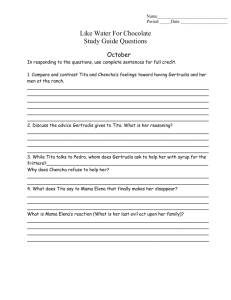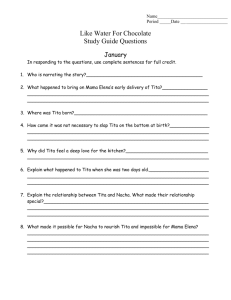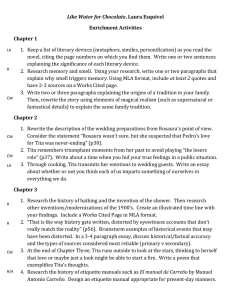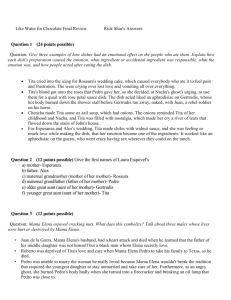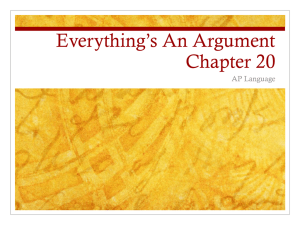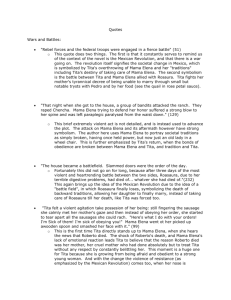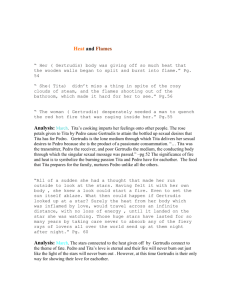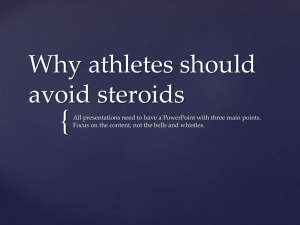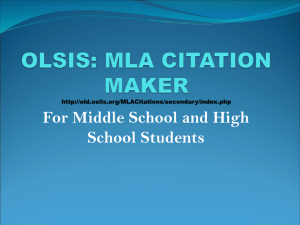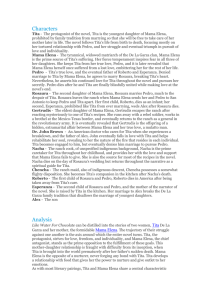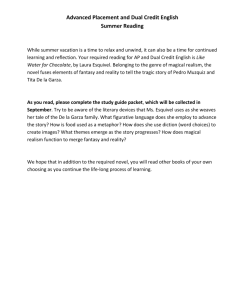Like Water for Chocolate Argumentative Essay Notes
advertisement
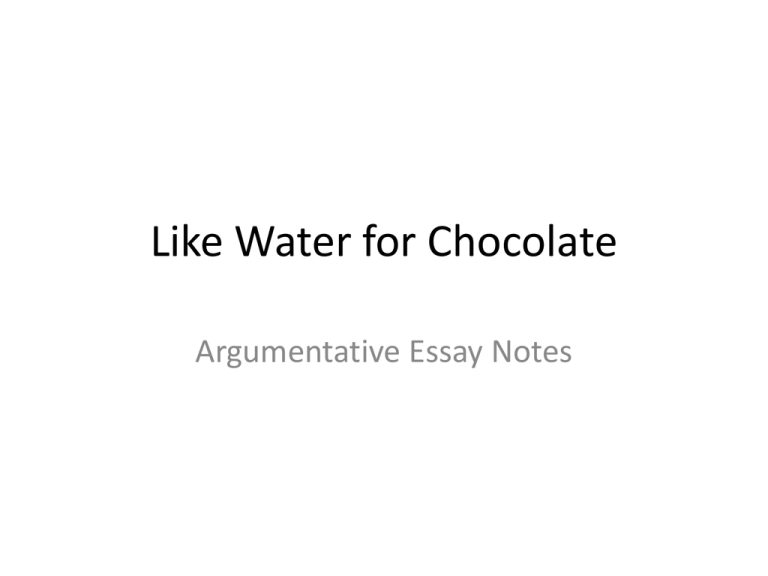
Like Water for Chocolate Argumentative Essay Notes December 11, 2012 • Aim: How do you select and incorporate evidence into an argumentative essay? • Do Now: Based on the text that you selected for your essay, paraphrase the following: • 1) Foster’s claim • 2) Vogler’s claim • Homework: Your selection of evidence to support your essay is due tomorrow (4 pieces to support your stance, 2 pieces that contradict your stance) Foster’s Argument • A hero’s journey does not have to be a physical journey as long as it has these key aspects: • 1) journey involves personal growth; selfknowledge is gained • 2) quester • 3) a place to go • 4) a reason to go there • 5) challenges • 6) A purpose for the quest (self-knowledge) Foster’s Argument • • • • • • A trip is a quest if: 1) quester 2) a place to go 3) a stated reason to go 4) a challenge/ dangerous route 5) Real reason/ purpose for the quest = selfknowledge Vogler’s Argument • • • • • • A hero goes through a journey: 1) ordinary world 2) Call to adventure 3) Refusal of the call Etc… In each step the hero (he/she) experiences a crisis and a climax, and the mentor guides the hero through these challenges. • Resurrection and Return: Hero returns to the ordinary world and the hero brings back an elixer, or treasure from the special world Vogler’s Argument • • • • • The archetypal journey involves a quest 1) ordinary world 2) call to adventure 3) refusal of the call (etc..) Every quest matches the archetypal steps: can be physical or an inner journey • Steps do not have to be completed in order How to Select Evidence • 1) Decide which aspects of Foster or Vogler’s argument are most relevant to your interpretation of Like Water for Chocolate. • 2) Look for portions of the text that are thoughtprovoking: moments in which Tita’s character undergoes a significant change, or when she is tested, or when she overcomes a challenge. • 3) Use an archetypal lens! Reread the annotations in which you noticed parallels to the hero’s journey. Selecting Appropriate Evidence • When is it appropriate to paraphrase? When is it better to cite text directly? • 1) Cite textual details when the writing itself is revealing or important: • 2) Paraphrase when the action of the story, or what happened is relevant, not the writing itself. Evaluate • “As Tita was putting the napkin over the container where she had set the dough to rest, a strong gust of wind banged the kitchen door wide open, causing an icy blast to invade the room. The napkin flew into the air and an icy shiver ran down Tita’s spine. She turned around and was stunned to find herself face to face with Mama Elena, who was giving her a fierce look” (Esquivel 173). Evaluate • Nacha became a mentor figure to Tita: she taught her the art of cooking; she helped her to feel at home in the De la Garza household; and she continued to be guiding and comforting presence long after her death. For example, when Tita is seeking refuge in John Brown’s home, Nacha appears to her as she eats soup. As Titas is revived by the warm broth, Nacha’s presence indicates how much Tita has recovered from her trauma (Esquivel 125). Embedding Evidence into Your Writing • Whenever you incorporate evidence into your writing, it’s important to provide the proper context, or set up, to help your reader understand where the evidence comes from and how it is relevant to your argument. • Use transitions to indicate who is speaking and to whom: • Esquivel writes, “ • Tita explains to John Brown, “ • It becomes clear from her interactions with Mama Elena that the traditions of the household are inflexible: Citation • MLA citations are required whenever you incorporate evidence. • When paraphrasing and when citing quotations directly: • “Quote” (Esquivel 125). • Paraphrased sentence (Esquivel 125). • “Quote” (Foster 3). December 12, 2012 • Aim: How do you create an effective introduction and claim in an argumentative essay? • Do Now: Take out your selection of evidence and your outline of the essay assignment. Be prepared to take notes. • Homework: Write an introductory paragraph for your argumentative essay. What are the qualities of an effective introduction? • 1) Introduce the topic, the texts and the authors • 2) Set up the premise for your claim – This essay is about the extent to which Tita is or is not a hero. Therefore your introductory paragraph must introduce: • Tita, Like Water for Chocolate, Laura Esquivel, and Foster OR Vogler • You need to explain the concept of a hero or a quest according to Foster or Vogler Proper Formatting and Citation • Remember that when referring to the title of a novel, you must underline when handwriting, and italicize it when typing. • Capitalize all words except for articles and prepositions: • Like Water for Chocolate • When citing the title of an essay, you should put it in quotation marks: • “Every Trip Is a Quest (Except When It’s Not)” • “Mapping the Hero’s Journey” Providing Proper Context • You should provide a one- to two-sentence summary of the novel that properly introduces Tita and the focus of the novel. • You also need to provide a brief description of Foster or Vogler’s argument (use the notes from yesterday and your own paraphrasing of their work) Creating a Claim • Your claim must answer the task and respond to all key words: • To what extent requires you to think about Tita’s heroism, or lack thereof, in a complex way: • 1) You could argue that she completely matches Vogler or Foster’s descriptions of heroism and/ or quests • 2) You could argue that she is a hero to some extent Analyzing Evidence to Formulate a Claim • 1) Look at the evidence you selected • 2) Next to each piece of evidence note which aspect of Vogler or Foster’s argument is applicable • 3) Evaluate what your evidence reveals: which aspects support or contradict Tita’s heroism? To what extent? Using Dependent and Independent Clauses to Create a Claim • Begin your claim with a subordinate conjunction: Because, Since, Although, Despite, Even though … • Creating a claim that uses both a dependent and independent clause • 1) Creates a complex statement that reflects the complexity of the prompt • 2) Enables you to address counterclaims within your claim Examples • Since Tita’s life follows Vogler’s aspects of the hero’s journey, specifically the ordinary world, the mentor, and the resurrection…. • Because the ultimate purpose of Tita’s quest is not self-knowledge… • Even though Tita does gain self-knowledge from her quest… • Despite the fact that Tita does not venture far from the De la Garza household… December 13, 2012 • Aim: How can I improve my introductory paragraph? What do effective topic sentences look like? • Do Now: 1. Self-evaluate your introductory paragraph • Homework: Revise your introductory paragraph and create an outline for your body paragraphs that contains the topic sentences for each. Agenda • 1) Peer review of introductory paragraphs • 2) Self-evaluation and planning of next steps • 3) What does an effective topic sentence look like? Qualities of Effective Topic Sentences • Serves as a “mini-claim” that sets up the premise for your body paragraph: • It answers the question: what will this paragraph focus on, and how does this relate to my claim? • It focuses on one part of your claim • May also serve as a transition between paragraphs – It answers the question: how is this paragraph related to the one that came before it? Ineffective Topic Sentences • For example, Tita relies on Nacha. • “Quote” (Esquivel 14). • Tita is often challenged by Mama Elena. Exemplar Topic Sentences • Tita’s heroism is demonstrated by her call to adventure. • Another aspect that shows that Tita does not fit the archetypal hero according to Vogler is her lack of a call to adventure. • Finally, Tita’s heroism is clearly shown when she experiences a resurrection and returns to the De la Garza household and disrupts its repressive traditions. Exemplars (continued) • Despite the fact that Tita’s quest ends in selfknowledge, her lack of independent movement from Mama Elena’s influence suggests that her journey may not live up to Foster’s definition of a quest. – This topic sentence would lead into a refutation paragraph… Practice • Create a topic sentence based on the following claim: • Because Nacha helped Tita to learn to love cooking, and appeared to her when she was most needed, it’s clear that she acts as a mentor figure in the novel. Homework • Create an outline of the body of your essay Affirmative 1. Topic sentence – Evidence (who is speaking?) + MLA citation – Evidence (who is speaking?) + MLA citation Affirmative 2. Topic sentence – Evidence (who is speaking?) + MLA citation – Evidence (who is speaking?) + MLA citation Affirmative 3. Topic sentence – Evidence (who is speaking?) + MLA citation – Evidence (who is speaking?) + MLA citation Refutation 4. Topic sentence -Evidence (who is speaking?) + MLA citation December 14, 2012 • Aim: How do I write analysis for affirmative and refutation paragraphs? How does the analysis differ?
